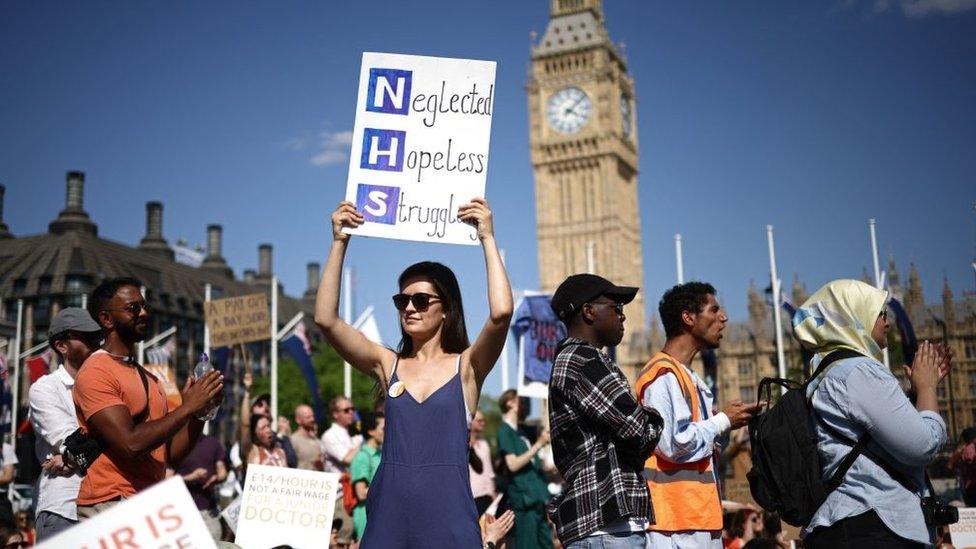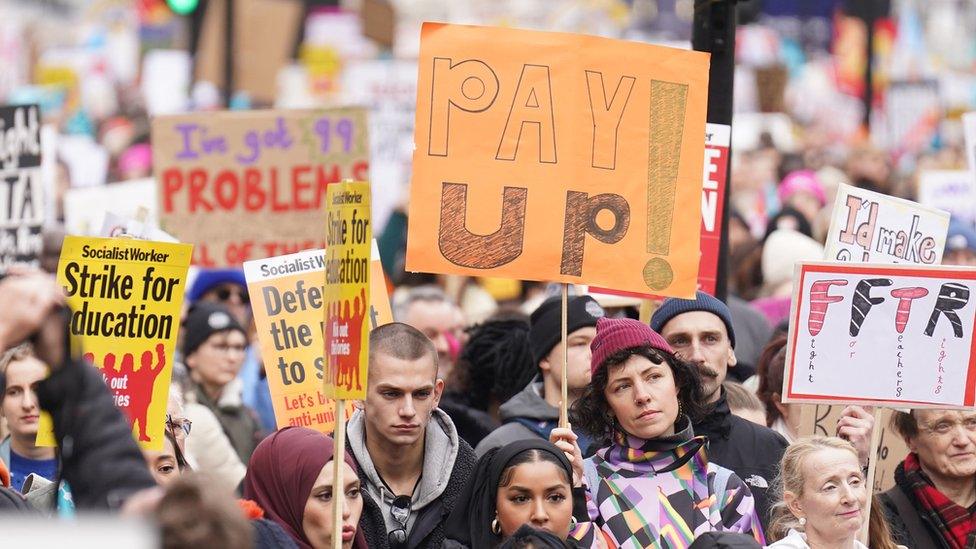Faisal Islam: The pay pain isn't over yet
- Published

A few months ago the government was suggesting that any public sector pay settlements above 5% would add to inflationary pressures. That was despite the fact that this still equated to a significant real terms pay cut, and public sector settlements do not directly add to pricing pressures.
On Thursday the government accepted settlements of up to 7% across a range of jobs, as recommended by the Pay Review Bodies.
Richard Hughes, who heads the Office for Budget Responsibility (OBR), told me that because the pay deals were being funded by savings made elsewhere, rather than through additional spending, they wouldn't be adding to the overall level of spending or the overall level of borrowing.
So in principle the pay awards would be "affordable, subject to those savings actually being realised", he said.
On whether 5% to 7% pay rises could entrench inflation, as the government had previously claimed, Mr Hughes told me: "The pressure that it puts on inflation would be offset, were the government to find savings elsewhere in departmental budgets, because that means that departments are spending less on other things, and that's not pushing up demand on goods and services elsewhere".
One of the arguments offered up by ministers over the past year has been that high public sector pay settlements could act as a ratchet for private sector wages, and thus contribute to inflationary pressures.
Inflation is proving stickier here than elsewhere. It is expected to remain at around 8% when new figures are released on Wednesday. In France it is now below 5%. In the US it has fallen to 3%.
So the numbers will remain high into next year and in the crucial months for calculating the state pension triple lock, the uprating of tax credits and benefits, and next year's public sector pay round.
High inflation will also mean tax receipts are higher, especially as the government has frozen income tax thresholds. But it's having an ugly effect on government borrowing costs.
This week's tricky pay decisions came in the wake of some awful long term tax and spending projections from the OBR.
The basic message of the OBR's fiscal risk report was that we are now in a new world of having both a large national debt and high and rising interest rates. In particular the UK's public finances are set to suffer even more than other countries', because a quarter of our debt is linked to inflation - bad news in current circumstances - and because our debt is also very short term.
When factoring in plausible future energy shocks, the OBR can see a path to national debt reaching an astonishing 300% or even 400% of national income in 2070. While some might rise an eyebrow about forecasts over this timeframe, the point is that the OBR fears a sluggishly growing UK economy, with a high debt and high interest rates, risks falling into a debt spiral.
It points to fears that the UK is spending everything on fighting the consequences of inflation rather than investing in the future.
As the former NHS Pay Review Body chair Jerry Cope told me for my Radio 4 Analysis documentary on strikes this week, a rejection of their recommendations would have prompted "fury" and elongated the period of strikes.
This deal keeps those Pay Review Bodies functioning as a way of defusing these pay tensions. But with inflation remaining high, and workers buoyed by using industrial action to secure higher wages, those tensions are not going to disappear.

Sign up for our morning newsletter and get BBC News in your inbox.

Related topics
- Published8 July 2023
- Published29 June 2023
- Published13 July 2023

- Published13 July 2023

